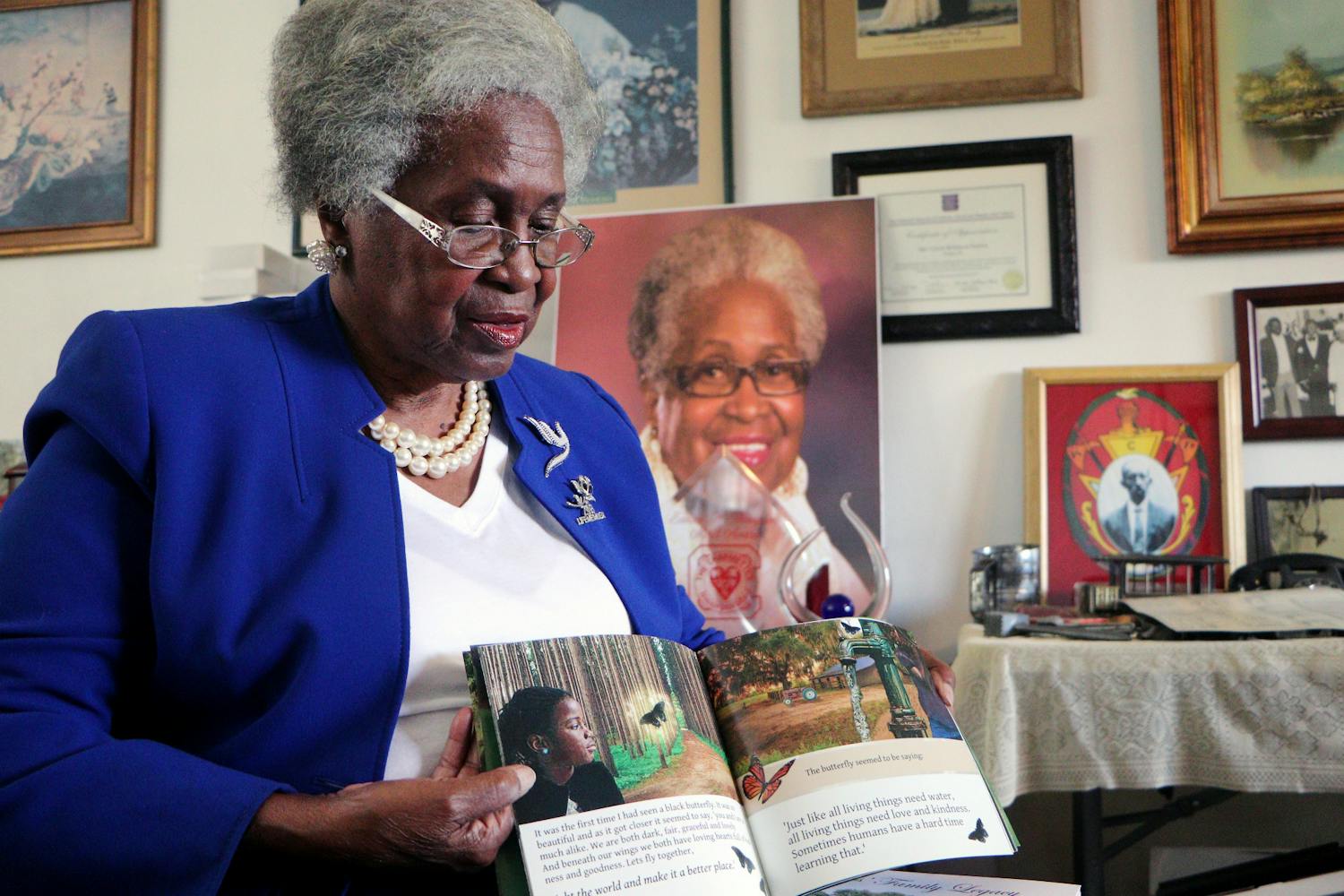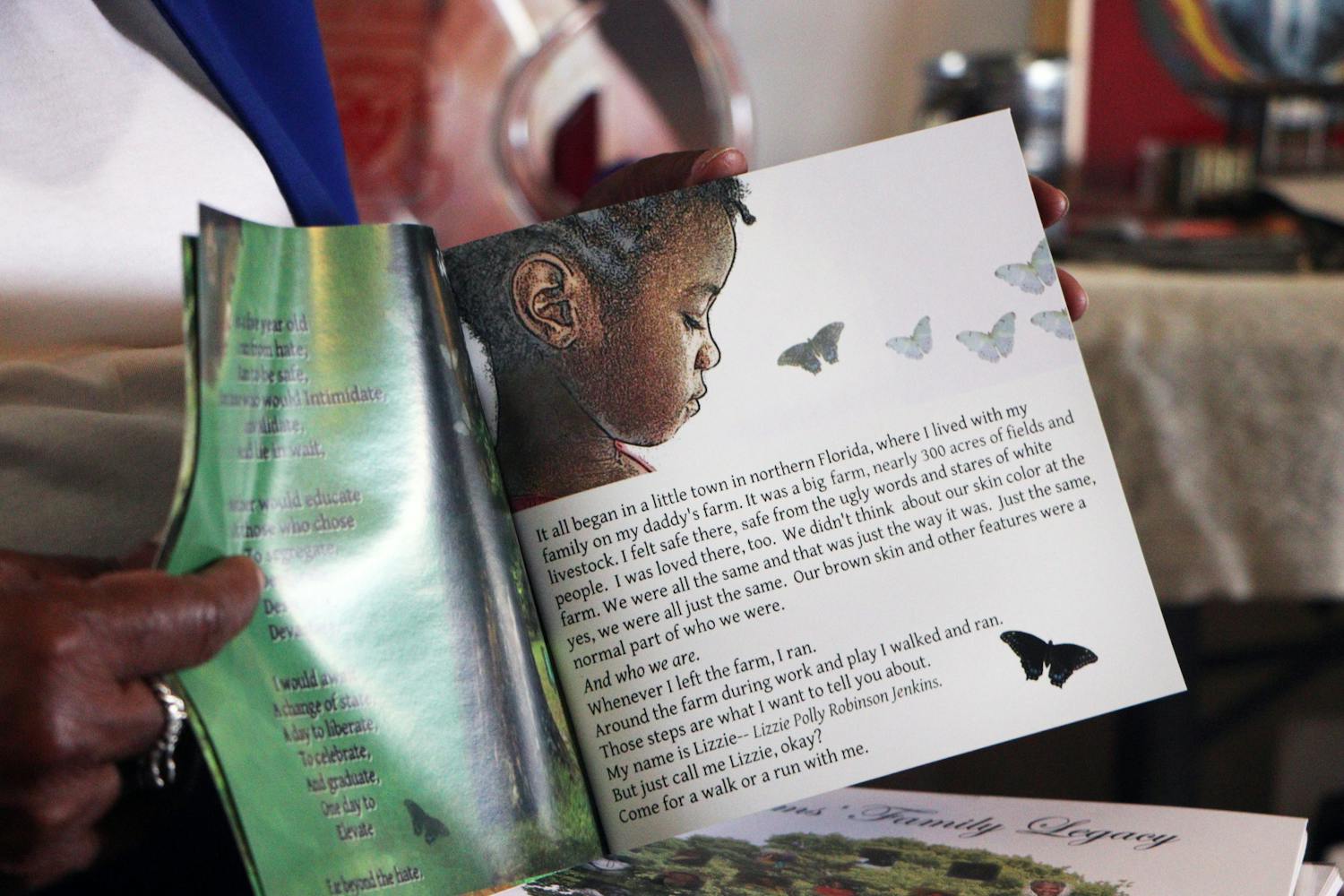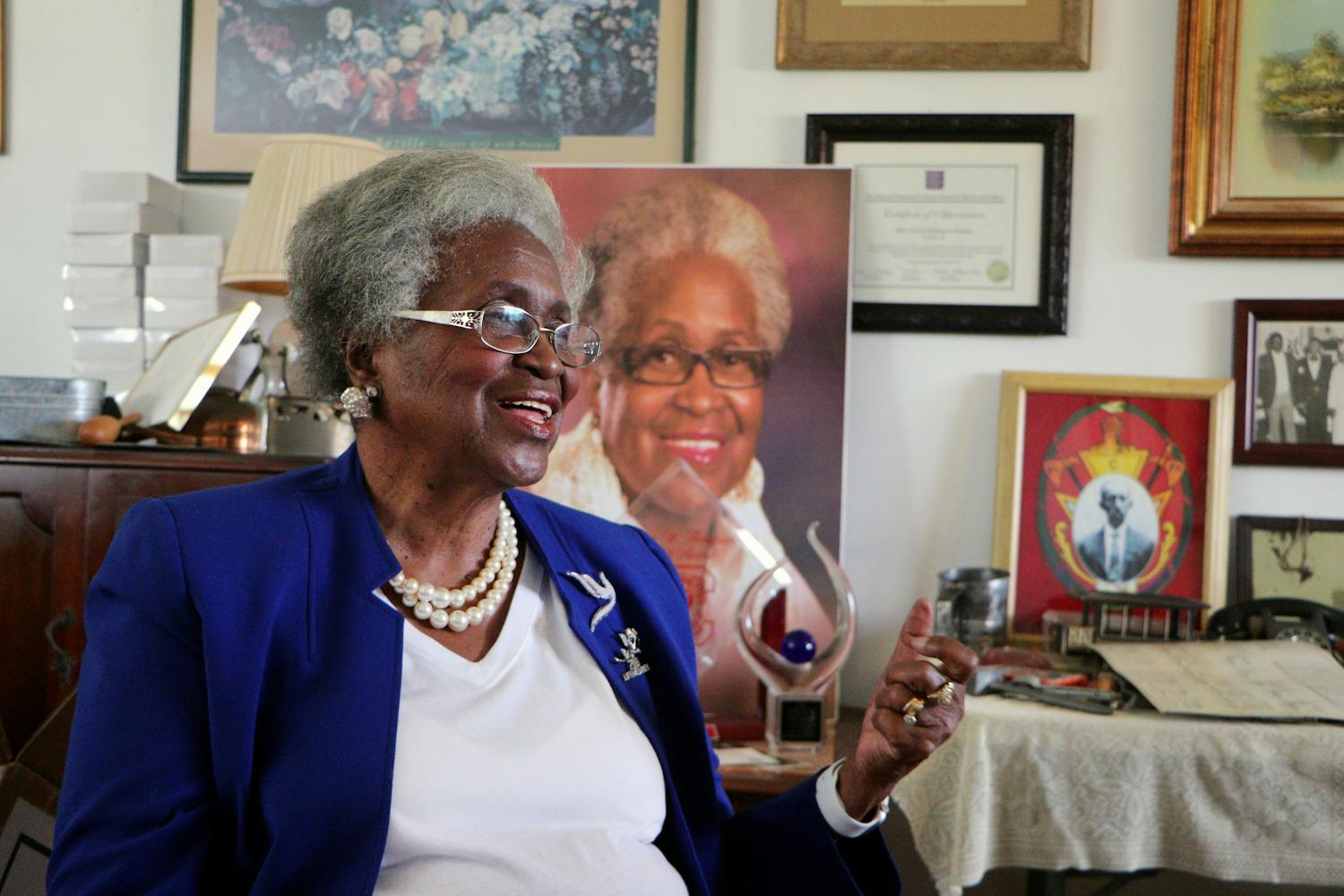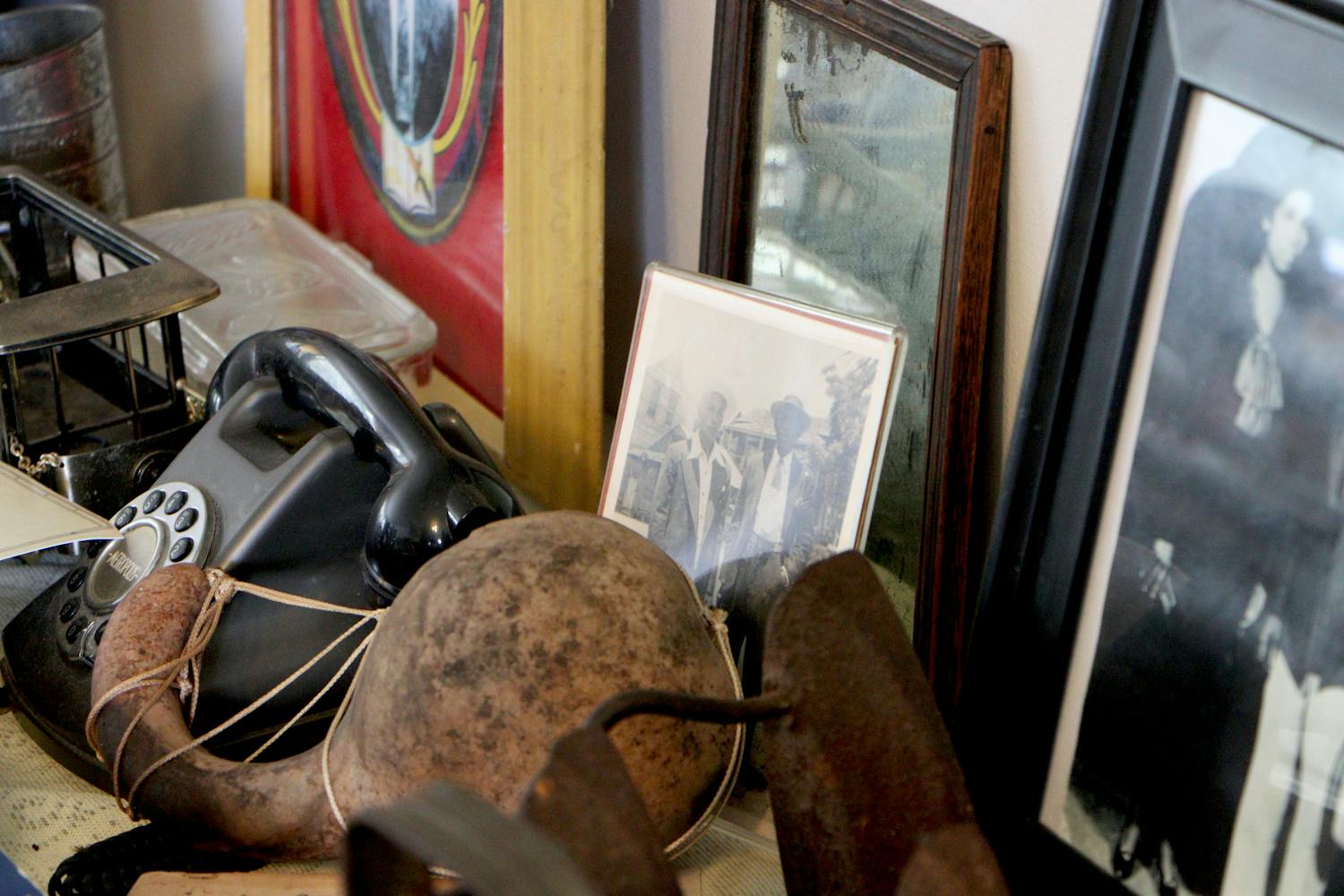As Lizzie Robinson Jenkins reached across the room for the frayed and discolored copy of “Through the Green Gate,” a decades-old hand-me-down book from her childhood, she slowly pulled the cover back until the delicate typography revealed an important phrase.
The children’s book published in 1939 begins the same way Jenkins signs off all her messages today: “Miss Lizzie.”
While Jenkins slowly thumbed through the copy, her eyes painstakingly took in the illustrations of white children before sighing.
“If I had an opportunity when I was a kid to get a book with Black children in it, it would have made all the difference in the world to me,” she said.
Now, the 84-year-old founder and president of the Real Rosewood Foundation, Inc. is passing on the opportunity for representation to a new generation with her upcoming children’s book titled “Lizzie’s Rosewood Race.” The book’s publication is scheduled for early 2023 to align with the centennial of the Rosewood massacre.
The publication of Jenkins’ book follows statewide debates on book banning, age-appropriate class materials and race-related instruction in classrooms. In April, Gov. Ron DeSantis signed a bill into law banning educators from teaching critical race theory, an academic concept that addresses systemic racism.
The book centers on Jenkins and her own coming of age, which she said was marked by a calling to keep the story of Rosewood alive.
Rosewood was a small, predominantly Black town an hour west of Gainesville that developed in the mid-1800s as people migrated through Cedar Key from other southern states. It remained a haven for Black locals through the Reconstruction and Jim Crow eras, and, like Tulsa, Oklahoma, it was thriving.
Still, the charged racial violence that marks American history knew no boundaries. On Jan. 1, 1923, a mob of white Sumner KKK members ravaged the quaint town, killing six known Black residents and inflicting lifelong physical and emotional agony on the rest of the community.
One of those surviving community members was Jenkins’ aunt, Mahulda Gussie Brown Carrier — a schoolteacher in Rosewood.
On a cold night when Jenkins was only five years old, her mother, Theresa Brown Robinson, sat her and her older siblings across the couch in front of the fireplace.
“Mama’s gonna tell you a story about Rosewood and sister,” Jenkins recalled her mother saying.
Jenkins could tell by the tone in her mother’s voice this story wasn’t like the fairytales other kids heard before bed, she said.
As the youngest sibling, Jenkins was stunned to find her brothers asleep and her sister overcome with disinterest as her mother’s story drew to a close. But there was something about Rosewood that kept her awake and clinging to her mother's every word, she said.
Jenkins’ mother told her she was ordained from birth to tell this story — to bear the burden of history.
But spending her life fulfilling her mother’s wish by sharing Rosewood’s history isn’t always easy, Jenkins said.
“It’s difficult to tell it — but people want to hear it,” Jenkins said. “She said, ‘Preserve history to make sure it doesn’t repeat.’”
Jenkins took the story of Rosewood to school with her the next day, she said — and then all the days after that. She went on to found the Real Rosewood Foundation in 2003, which focuses on researching, documenting and preserving the story of the Rosewood massacre for future generations.
Rob Murphy, a 69-year-old poet, artist and historical activist from Utah, first visited Cedar Key to help a friend with travel. His obligatory internet search of the area eventually led him to the Real Rosewood Foundation.
Murphy was captivated by Jenkins and the story of Rosewood, he said. He immediately wrote an 18-line poem about the dark story — but had no indication that Rosewood would eventually trigger his permanent move to Florida in December.
Jenkins and Murphy exchanged stories, sentiments and tears for months before the idea of writing a book was born. When Murphy first became adamant about sharing Jenkins’ story, he knew it couldn’t be a standard biography.
Instead, he imagined Jenkins’ heartwrenching life manifesting as encounters with butterflies, birds and other animals. The simple and playful nature of the storybook allows readers of all ages to digest sometimes threatening messages on prejudice and racism, he said.
“The beauty of her story is that it gives people a chance to talk about race differences and things of our past that we’re not proud of in a format that is non-threatening,” Murphy said.
The book draws inspiration from the dirt road where Jenkins used to walk three miles to and from school every day, carrying the weight of the Rosewood story along with her. As the reader turns each page, young Jenkins makes her way down the same dirt road, encountering nature that portrays lessons on beauty, uniqueness and inclusion.
The young girl and protagonist’s first encounter is with a black butterfly. She says she’s never seen one before.
“This butterfly tells her ‘I’m Black, I’m beautiful, I’m unique and so are you,’” Murphy said.
The story of Rosewood is inherently violent and distressing, but Jenkins and Murphy both agreed “Lizzie’s Rosewood Race” would be an agreeable way to start conversations between students, parents and teachers about Florida’s dark history that were safe, age-appropriate and focused on a real character.
While campaigning for the midterm elections, Jenkins had the opportunity to show her book to a 2-year-old Black girl and her grandmother. The little girl’s curious finger landed on the depiction of young Lizzie before saying one word that validated Jenkins’ newest writing project: “Me.”
“I could have fallen out of my chair,” Jenkins said.
After the book’s publication, copies will be available for purchase on the Real Rosewood Foundation’s website, but Jenkins is passionate about personally bringing her story to different classrooms around north Florida. She plans on doing a book tour next year, she said.
A former teacher herself, Jenkins said she understands the way children learn and process diversity. When school members in Archer were concerned about racial disparities in office visits and behavior infractions, Jenkins knew she could help.
“They need to see a Black face,” she said. “They need to see a presence they don’t see. It’s not because the kid is being disrespectful — you just don’t understand how to meet their needs.”
Telling the story of Rosewood will always be hard, Jenkins said. But her mother told her to keep the story alive, and that’s what she is aiming to do with “Lizzie’s Rosewood Race.”
“If we start with children — especially in a volatile political climate where it’s controversial to talk about Black history and race — it would be a wonderful introduction to the larger picture of Rosewood,” Murphy said.
Contact Averi at akremposky@alligator.org. Follow her on Twitter @averijkremposky.

Averi Kremposky is a senior journalism major at the University of Florida. When she’s not covering music, art and culture beats for The Avenue, you can find her going to a concert, finishing another book in one sitting or submitting to the latest Taylor Swift album theory.










